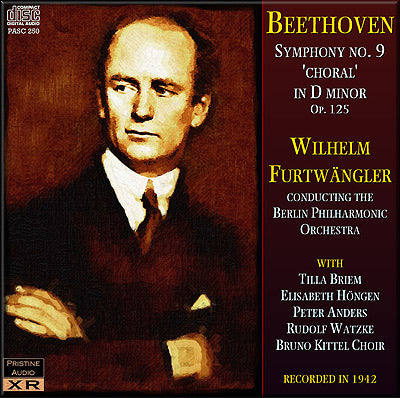
This album is included in the following sets:
This set contains the following albums:
- Producer's Note
- Full Track Listing
- Cover Art
Furtwängler, Berlin 1942: perhaps the greatest Beethoven 9 ever
The infamous, astonishing performance in an outstanding sonic resurrection
The history of this recording is well known and takes us deep into one of the darkest eras of human history: Nazi Germany, the performances around the celebration of Hitler's birthday in March 1942, and a conductor who some saw as a collaborator, others an a naive tool of the regime, others still as someone who chose to oppose from within rather than leave Germany like so many other top-ranking musicians. The wider subject is covered in some depth in the further notes which accompany this release, and of course in much greater depth elsewhere.
It is pertinent to mention here, however, that many have come to see Furtwängler's Beethoven 9th Symphony of March 1942 as a kind of protest against Hitler and his henchmen, present for at least one of the performances that week. It has been hailed as one of the greatest and most powerful renditions of this momentous work ever captured by the miracle of recorded sound, as multiple five-star reviews on sites such as Amazon.com testify. Naturally it has seen numerous releases on different labels.
Each previous issue has, no doubt, attempted to deal with the rather poor quality of the original recording in one way or another, so why come back to in for another go? Well partly this has been due to requests received from those desperate for someone to crack the major sonic shortcomings of the recording, in the hope that XR remastering might achieve something where previous efforts have failed, and partly (as is often the case) through sheer curiosity on my part. I had been working on another performance by Furtwángler of the same work, and while I had the various elements of an XR restoration to hand curiosity got the better of me and I experimented with the 1942 Choral Symphony.
The results you'll hear in our lengthy sample on this page, comprising the full first movement. Despite some occasional fuzziness caused by peak distortion (much of which I've been able to tame considerably) during the loudest passages, the transformation has been exceptional, allowing the full power and impact of Furtwängler's vision to be experienced as perhaps never before (unless you had the "luck" to be in the hall at the time). Background hiss and noise has been reduced to near-silence, a number of audience coughs have been removed, and XR remastering has brought a fullness and depth of sound, matched by a new openness and clarity lacking in all previous issues.
Experience now one of the most powerful and charged music performances you'll ever hear - in a whole new sonic light.
Andrew Rose
-
BEETHOVEN Symphony No. 9 "Choral" in D minor, Op. 125
Tilla Briem, soprano
Elisabeth Höngen, alto
Peter Anders, tenor
Rudolf Watzke, bass
Bruno Kittel Choir
Recorded live in Berlin, 22-24 March, 1942
Berlin Philharmonic Orchestra
conductor Wilhelm Furtwängler
MusicWeb International Review
For those who want a recording of Furtwängler’s famous 1942 account this is the best I have heard.
Wilhelm Furtwängler’s legendary 1942 Berlin performance of
Beethoven Choral Symphony has been available on
several labels. I have the performance on the Archipel Desert
Island Collection ARPCD 0002 and on the Société Wilhelm Furtwängler
SWF 891R.
Each restoration engineer will have wanted to improve the sound
quality of previous attempts. On this Pristine Audio release
Andrew Rose in September and October 2010 carried out the XR
re-mastering. Yes, there is still some occasional fuzziness;
however, I was particularly impressed by the reduction in the
background hiss. A number of the worst coughing episodes have
been removed and much of the fierceness arising from peak distortion
has been effectively smoothed away. The recording is vastly
improved but it’s still not perfect. I make the appeal to try
and listen through the sound quality because this is a truly
great performance of real historic significance.
This 1942 Berlin performance has gained legendary status and
is said to be an example of Furtwängler’s rebellious response
to the stresses of working with the Berlin Philharmonic as cultural
propagandists for Hitler’s Third Reich. Whether this is a true
reflection of the situation or not this is certainly a heartfelt
account of astonishing tension from Furtwängler’s tortured soul.
In the opening movement I was struck by the ferocity
of the propulsive climaxes and the sense of torment and anger.
The Scherzo is so powerful and brisk. That overt sense
of incredible anguish unleashed in the fortissimos is
practically demonic. Dark foreboding flows from the depths through
the double-basses and cellos. It would be implausible that Furtwängler
is doing anything other than venting his angst through this
troubling music. An eerie sense of calm pervades the slow movement.
The beautiful playing of the woodwind choir and the sonorous
strings add to the poetic atmosphere. In the crowning finale
with its famous choral setting of Schiller’s Ode to Joy
the fury returns marked by the vehemence of the drums. Darkling
intimations from the double-basses and cellos send a shiver
down the spine. The entrance of the baritone soloist and Choir
comes as a welcome relief. I found the singing ardently incisive
throughout. At the close of the score the exultation is unalloyed.
For those who want a recording of Furtwängler’s famous 1942
account this is the best I have heard.
Michael Cookson

